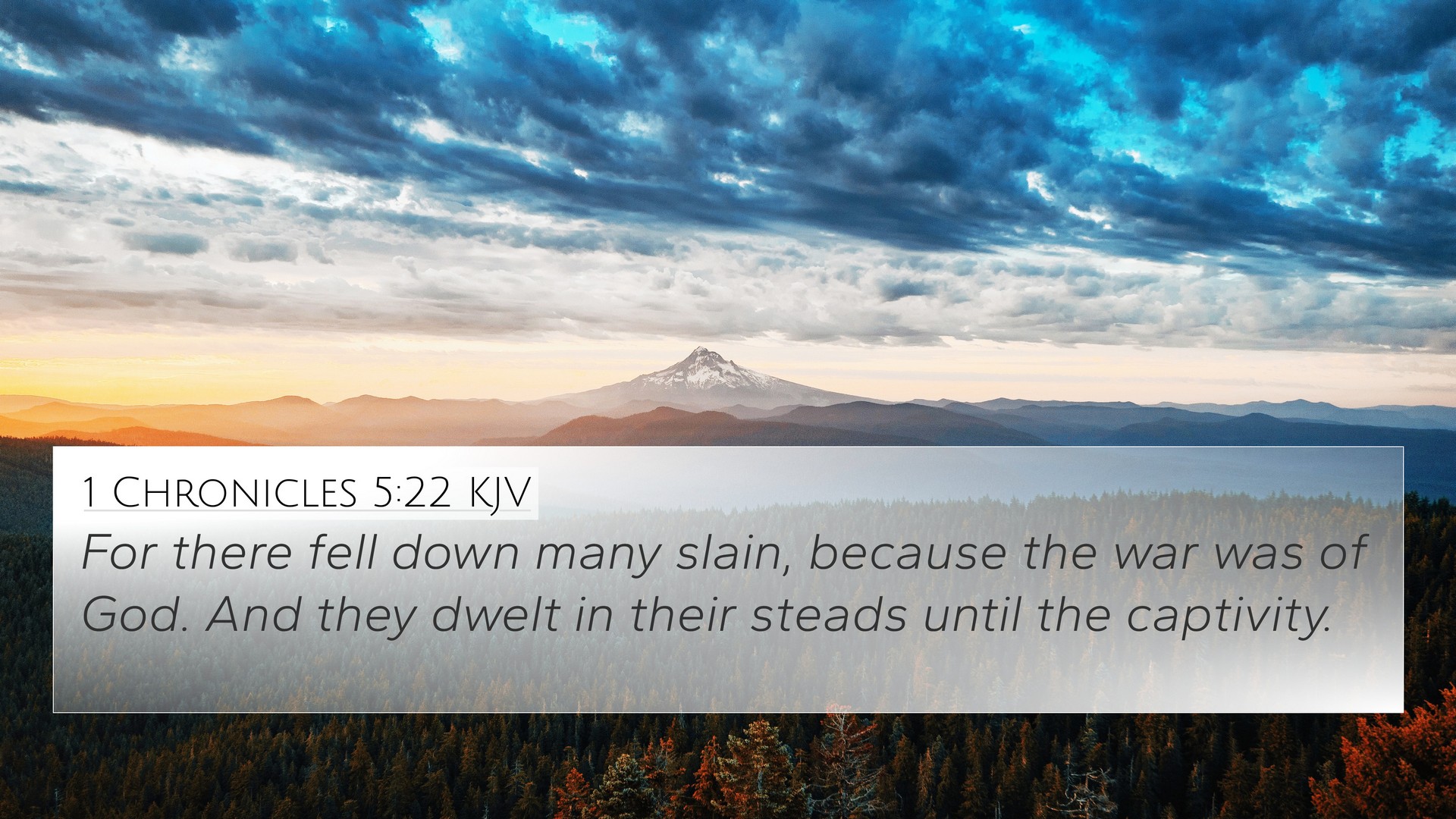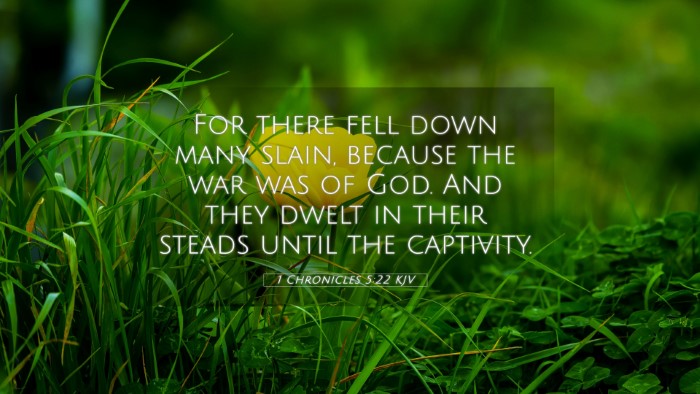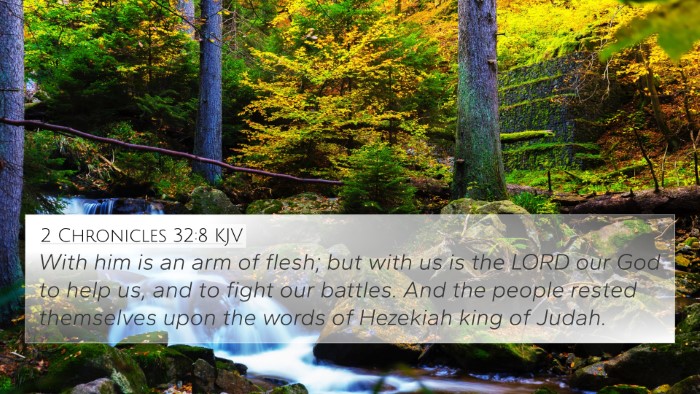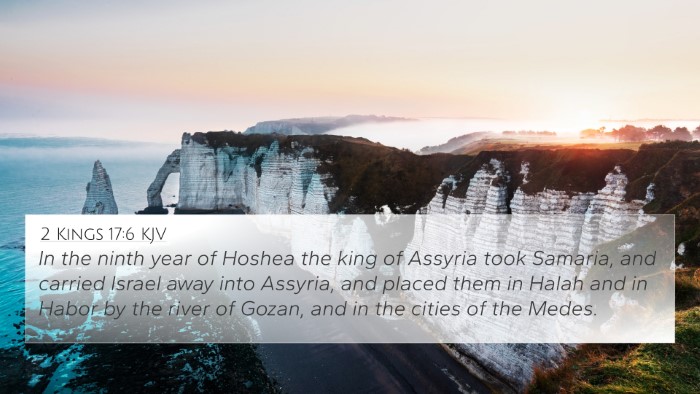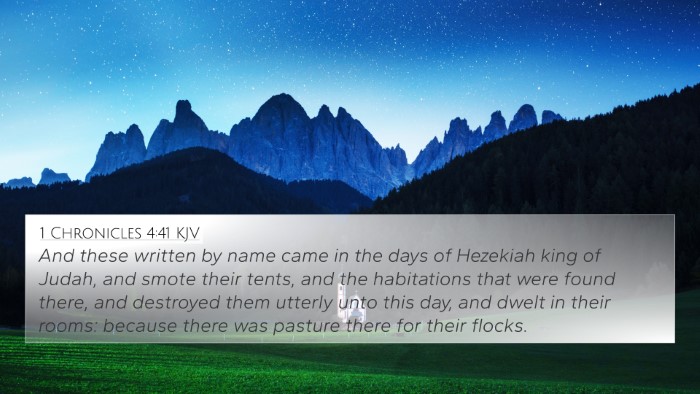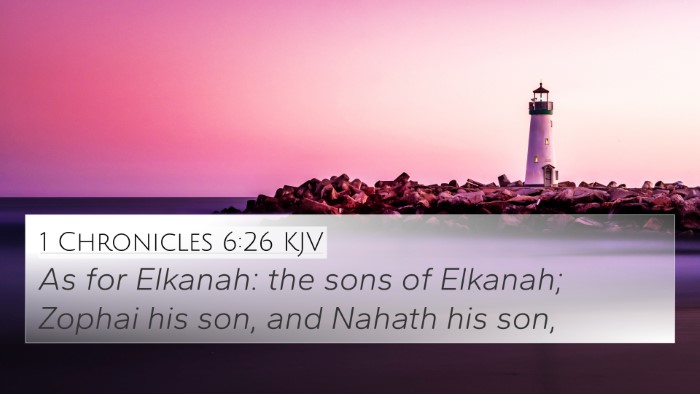Understanding 1 Chronicles 5:22
Verse: “For there fell down many slain, because the war was of God. And they dwelt in their steads until the captivity.”
Meaning and Interpretation
This verse recounts an important event during the time of the Reubenites, Gadites, and the half-tribe of Manasseh, who engaged in a battle against the Hagarites. The context implies that the conflict had divine significance, suggesting God's hand was in the outcome of the battle. Here we will explore insights drawn from notable public domain commentaries.
Insights from Commentaries
-
Matthew Henry:
Matthew Henry emphasizes the sovereignty of God in battle. He explains that the victories won were not solely due to human strength but stemmed from divine intervention, illustrating God's support for His people. Henry also points out the lingering presence of the defeated foes even after their initial loss, suggesting ongoing conflict and the challenges of maintaining peace.
-
Albert Barnes:
Barnes draws attention to the nature of the conflict as being “of God,” framing the war as a necessary confrontation against those who opposed God's people. He suggests that this indicates that God orchestrates events, using human actions to fulfill His purposes. The aftermath, where the Israelites settled and remained in the land, signifies stability despite previous turmoil.
-
Adam Clarke:
Clarke elaborates on the significance of "the families" involved, underlining the identity and heritage of the tribes. He provides a historical backdrop reflecting the struggles of these tribes against external threats and explains how divine providence led them to their territories. This highlights the theme of God granting victory and the occupation of promised land.
Cross-References and Thematic Connections
1 Chronicles 5:22 connects with several other biblical passages that illuminate its meaning and implications. Below are notable cross-references:
- 2 Chronicles 20:15: “Thus saith the Lord unto you, Be not afraid nor dismayed by reason of this great multitude; for the battle is not yours, but God’s.”
- Exodus 14:14: “The Lord shall fight for you, and ye shall hold your peace.”
- 1 Samuel 17:47: “And all this assembly shall know that the Lord saveth not with sword and spear: for the battle is the Lord's, and he will give you into our hands.”
- Joshua 1:9: “Have not I commanded thee? Be strong and of a good courage; be not afraid, neither be thou dismayed: for the Lord thy God is with thee whithersoever thou goest.”
- Psalms 44:3: “For they got not the land in possession by their own sword, neither did their own arm save them: but thy right hand, and thine arm, and the light of thy countenance, because thou hadst a favor unto them.”
- Psalms 108:13: “Through God we shall do valiantly: for he it is that shall tread down our enemies.”
- Romans 8:31: “What shall we then say to these things? If God be for us, who can be against us?”
Implications for Personal Faith
The verse serves to encourage individuals to recognize God’s overarching sovereignty in life's battles—both literally and metaphorically. It reassures believers of divine support even during challenging times. It reminds readers to appreciate their heritage and the history of God's dealings with His people, which can provide context and assurance in their struggles.
Tools for Bible Cross-Referencing
Understanding 1 Chronicles 5:22 requires utilizing various tools for cross-referencing Bible verses effectively:
- Bible Concordance: A tool that lists words and provides their corresponding verses, aiding in thematic studies.
- Bible Cross-Reference Guide: Offers connections between related verses that deepen understanding.
- Cross-Reference Bible Study: A method that involves comparing scripture to scripture, yielding a more comprehensive view.
- Bible Reference Resources: Various guides and commentaries can provide additional insights on specific verses.
- Bible Chain References: A system for linking verses based on thematic connections or narrative parallels.
Conclusion
1 Chronicles 5:22 is a profound verse that illustrates God's involvement in human affairs, specifically in battles that they face. By examining this passage alongside connected verses, believers can reinforce their understanding of divine guidance and support in their lives, ultimately leading to greater faith and confidence in God’s promises.
